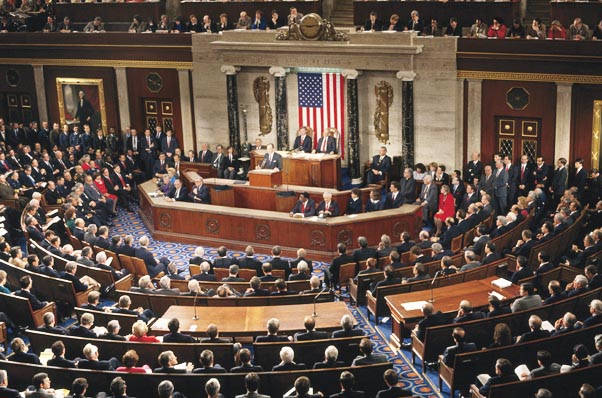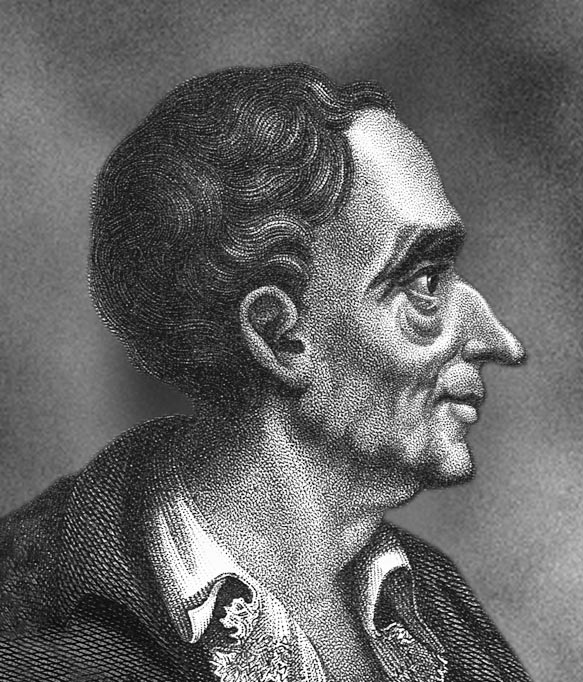
IN CONTEXT
Constitutional politics
Separation of powers
509 BCE After the overthrow of King Lucius Tarquinius Superbus, the Roman Republic is founded, in which a tripartite system of government evolves.
1689 After the “Glorious Revolution” in England, a constitutional monarchy is established.
1787 The Constitution of the United States is adopted in Philadelphia.
1789–99 During the French Revolution, a secular democratic republic replaces rule by the monarchy and the church.
1856 Alexis de Tocqueville publishes The Old Regime and the Revolution, an analysis of the fall of the French monarchy.
During the 18th-century Age of Enlightenment, the traditional authority of the Church was undermined by scientific discoveries, and the idea of monarchs ruling by divine right was called into question. In Europe, particularly France, many political philosophers began to investigate the power of the monarchy, clergy, and aristocracy. Foremost among these were Voltaire, Jean-Jacques Rousseau, and Montesquieu.
Rousseau argued for power to be shifted from the monarchy to the people, and Voltaire for a separation of church and state. Montesquieu was less concerned with who took the reins of government; of more importance to him was the existence of a constitution that would protect against despotism. This could be achieved, he argued, by a separation of the powers of government.
"The deterioration of a government begins almost always by the decay of its principles."
Montesquieu
Montesquieu argued that despotism was the single greatest threat to the liberty of the citizens, and both monarchies and republics risked degeneration into despotism unless regulated by a constitution that prevented it. At the heart of his argument was the division of the administrative power of a state into three distinct categories: the executive (responsible for the administration and enforcement of laws), the legislative (responsible for the passing, repealing, and amending of laws), and the judicial (responsible for interpreting and applying the laws).

Separation of powers
This distinction between the different branches of governmental power, sometimes known as the trias politica, was not new—the ancient Greeks and Romans had recognized a similar division. Where Montesquieu was innovative was in his advocacy of separate bodies to exercise these powers. This would create a balance, ensuring stable government with minimal risk of decline into despotism. The separation of powers ensured that no one administrative body could become all-powerful, since each would be able to restrict any abuse of power by the others. Although Montesquieu’s ideas were inevitably met with hostility by the authorities in France, his principle of the separation of powers was hugely influential, especially in the US, where it became a cornerstone of the Constitution. Following the French Revolution, it also formed a model for the new republic, and as democracies were established worldwide over the next century, some form of the tripartite system was generally included in their constitutions.

The United States Congress is the legislative branch of the federal government; its powers are separate and distinct from those of the President (executive branch) and the Judiciary.
MONTESQUIEU

Montesquieu was born Charles-Louis de Secondat near Bordeaux in France, and inherited the title of Baron de Montesquieu upon the death of his uncle in 1716. He studied law at Bordeaux, but his marriage in 1715 brought him a substantial dowry, which, along with his inheritance, allowed him to concentrate on his literary career, starting with the satirical Persian Letters.
Montesquieu was elected to the Paris Academy in 1728, and began a series of travels to Italy, Hungary, Turkey, and England. After his return to Bordeaux in 1731, he worked on his history of the Roman empire as well as his masterwork, The Spirit of the Laws, which was published anonymously in 1748. Praised elsewhere in Europe, it had a hostile reception in France. Montesquieu died of a fever in Paris in 1755.
Key works
1721 Persian Letters
1734 Considerations on the Causes of the Greatness of the Romans and Their Decline
1748 The Spirit of the Laws
See also: Cicero • Jean-Jacques Rousseau • Thomas Jefferson • James Madison • Alexis de Tocqueville • Henry David Thoreau • Noam Chomsky
